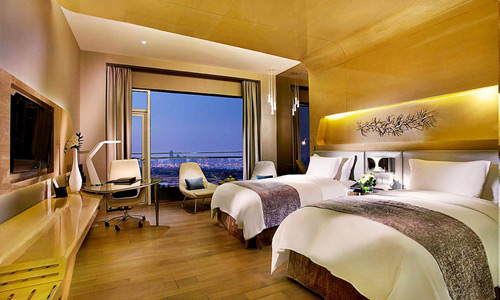✕

Column: industry Tag: Host Hotels,third-quarter earnings,Host Hotels & Resorts Published: 2017-11-06 13:38 Source: Author:

BETHESDA, Maryland—Despite hurricanes, wildfires, a tough comp in Brazil and a significant holiday shift, executives at Host Hotels & Resorts reported the company met previous performance expectations during the third quarter.
Host Hotels President and CEO James Risoleo said during the company’s third-quarter earnings call that comparable systemwide revenue per available room dropped 1.8%, matching the company’s internal expectations. Comparable RevPAR dropped 1.1% year over year due to comparisons in Brazil, host of the 2016 summer Olympics, he said, and Hurricanes Harvey and Irma combined for a combined 0.5% drop as well.
Prior to the storms, the company was actually ahead of its forecast in July and August.
“It is important to realize we have kept our hotels in Houston and Florida as comped despite the damage and closures we experienced,” Risoleo said.
The major takeaway from the quarter is the company managed its expenses, cutting comparable expenses by $13 million and more than 1.5%. Risoleo called it remarkable considering many markets are experiencing nearly full employment.
Host Hotels is beginning to see the early signs of margin improvement from Marriott International’s integration of Starwood Hotels & Resorts Worldwide, he said. However, most of those benefits won’t take hold until late 2018 and early 2019.
The call also marked the retirement of EVP and CFO Gregory Larson later this month and introduced Michael Bluhm of Morgan Stanley as his successor.
As of press time, Host Hotels stock was up 3.3% year to date. The Baird/STR Hotel Stock Index?was up 33.3% over the same period.
Transactions and redevelopment
Host Hotels sold one of its noncore hotels during the quarter, the Sheraton Indianapolis Hotel at Keystone Crossing, for $66 million, Risoleo said, and it also sold the land at the Chicago Marriott O’Hare for about $10 million. Host also closed on the sale of the Hilton Melbourne South Wharf for $184 million, ending the company’s investment activity in Australia and New Zealand.
Executives are excited about the pending sale of the Key Bridge Marriott in Arlington, Virginia, Risoleo said. The buyer has the property under contract for $190 million with $8 million for furniture, fixtures and equipment reserve, and there is $12 million at risk. The hotel is the oldest in Marriott’s system, he said, and it needs significant capital investment. However, it has potential for residential, office and retail redevelopment.
“This is a great example of how we are mining the portfolio to opportunistically create and drive real estate value for stockholders,” Risoleo said. “We anticipate the deal will close by either late 2017 or by end of the first quarter 2018.”
Host Hotels has received approval on its plan to rezone the Phoenician, a Luxury Collection Resort, Risoleo said, enabling the company to sell about 60 acres of land for residential housing. There will be a mix of 338 new single family homes, townhomes and condominiums and 20 additional resort casitas.
“We now have begun marketing to interested residential developers and estimate incremental net profits from land sales of approximately $50 million to $65 million,” he said. “We anticipate receiving those proceeds by mid-2019.”
When underwriting and purchasing this property in 2015, Host ascribed no value to residential land development, he said. This is incremental to the original underwriting, increasing the total 10-year unleveraged return by 100 basis points, and it should provide long-term revenue benefits as future new residents take advantage of the transformed facilities.
The company’s 2017 guidance does not contemplate additional acquisitions other than those disclosed earlier in the year, he said. It sees assets that would fit its target profile coming to market this fall, but the company will remain disciplined in allocating capital, particularly considering the industry could be in the later stages of the cycle.
Group business
A 7% decrease in group business demand in the third quarter was the primary driver of the decline in RevPAR, Risoleo said. As expected, the Jewish holiday shift affected September performance negatively, dropping group demand by more than 10% for the month.
Looking ahead, the company has more than 98% of group business on the books for 2017, he said, and Host continues to see the booking window extend as group revenue booked in the quarter for 2019 and beyond has increased. The company also saw Q3 group bookings in the quarter increase almost 5.8% year over year, he said.
Group revenues on the books for 2018 are positive, Risoleo said, matching the same amount year over year.
“At this point, we feel our 2018 group business is solid,” he said.
The decline in group demand in the quarter was offset by the increased transient demand, which moved up 1.3%, Risoleo said, and in contract business, where demand grew almost 22%.
“As we have noted before, we have been strategically taking contract business in higher-rated markets, such as San Francisco, where (there are) expected group demand gaps,” he said.
Transient increases are reliant on group demand to allow managers to drive rate, Risoleo said. The challenges in group business made it more difficult to benefit on the rate side, so transient average rate decreased 2.3%. Overall, transient revenue decreased 1%.
“However, we continue to be impressed with our transient business demand, particularly leisure, which remains strong, and it continues to be driven by high consumer sentiment, low oil prices and low unemployment,” he said.
Previous:Hyatt to sell $1.5b in assets, signaling strategy shift
Next:RLHC continued franchise-business growth momentum in Q3
Hot key words
Hot Products
Popular Vendors